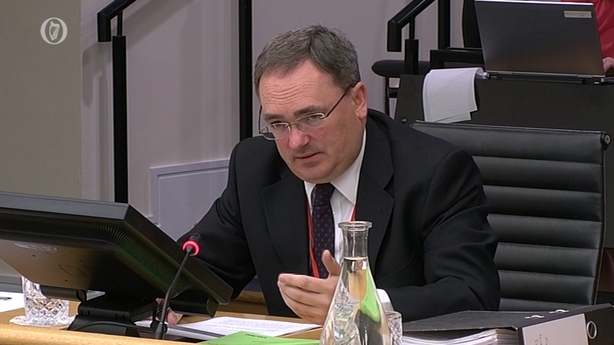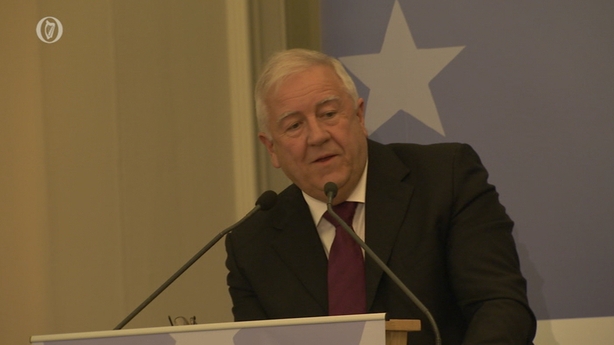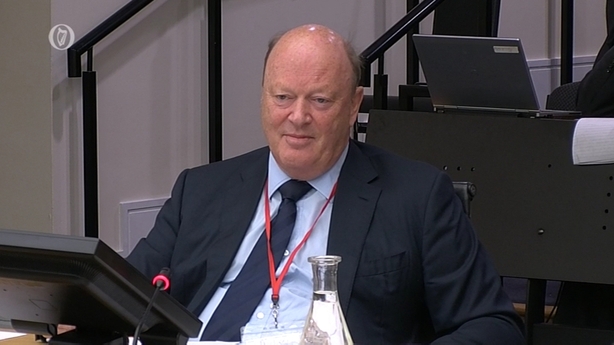A former adviser to Brian Lenihan has told the banking inquiry that it does not sound accurate that he was "overruled" on the night of the bank guarantee.
Cathy Herbert said she was aware the then-finance minister had argued strongly for nationalising Anglo Irish Bank but he would have understood how government decisions were made collectively.
She said that when Patrick Honohan said Mr Lenihan was overruled, she was not sure whether that was Mr Honohan's own language.
She said she spoke to Mr Lenihan in Government Buildings that night at around 2.30am or 3am after the decision was made and said he was worried about the importance of the decision and whether it would be enough, whether it would stick.
They did not discuss the nationalisation option at that time.
She also said that towards the end of his life, Mr Lenihan said he felt the guarantee was the best decision that could have been made at the time.
Mr Lenihan died in June 2011 after a battle with cancer.
Ms Herbert said she had no role in banking policy. Her work concentrated on communicating the difficult and complex decisions made.
She worked as an adviser to the minister from June 2006 when he was Minister for Children.
She said he was suspicious of the banks but he did not know whether they were misleading him or whether there was ineptitude and he was concerned about the extent of exposures and cross-collateralisation.
She said he was irritated at Mr Honohan's intervention on RTÉ; he was surprised and it made for a difficult day.
Mr Lenihan had a view that some of the anonymous briefings in advance of the bailout were coming from Central Bankers of other member states.
She said there was a fair amount of panic on the other side as well.
She said Mr Lenihan agreed th the findings in the Wright Report about a lack of expertise in the Department of Finance and said he did seek advice outside the department, including Mr Honohan and economists David McWilliams and Alan Ahearne, who was later appointed an adviser.
On the night of the guarantee, she was in Government Buildings at the request of Mr Lenihan but did not attend any meetings and said the discussions were held by a small group of officials.
Ms Herbert said the media strategy around the banks was not to frighten the horses. Details were held very tightly among a small group of officials.
There was a communications strategy in place for a possible bank nationalisation in order to inform customers and the media.
If Mr Lenihan had been overruled, or had a serious disagreement, she would have known.
Mr Lenihan had fought a real battle to keep the country out of a bailout, the inquiry was told.
He was anxious to see if a precautionary bailout could be secured using the four-year plan and was concerned about the interest rate and how the bailout would deal with the banks.
Individual countries had pushed for a hike in corporation tax but it was a red line issue for the minister, Ms Herbert said.
McDonagh says NTMA ‘resisted’ pressure to increase deposits in Irish banks
The former finance director at the National Treasury Management Agency has told the banking inquiry that they resisted considerable pressure from the Central Bank and the Department of Finance in September 2008 to increase its deposits in Irish banks.

Brendan McDonagh, currently head of NAMA, said they refused on the basis that the Central Bank should be the lender of last resort.
He said this caused considerable tension but the NTMA maintained its position.
He said all signs were pointing to Irish Nationwide Building Society and Anglo Irish bank being nationalised, the suggestion of a blanket guarantee came out of nowhere.
Mr McDonagh said the first he heard of a potential blanket bank guarantee was just three days before the decision was made, in an email from a Department of Finance official.
He replied that the exchequer exposure from the banking system had not yet been independently quantified and that made assessment of a bank guarantee extremely difficult.
Credit ratings agencies would be taken aback at the scale of State involvement in a blanket guarantee and there would be an immediate credit ratings downgrade.
Mr McDonagh said there was a very strong view in the NTMA that INBS and Anglo should have been nationalised.
He said they were always sceptical about Anglo, its business model and its funding was also under pressure.
He said Anglo should certainly have been nationalised on the night which might have allowed certain actions to be taken sooner.
The NTMA had stopped placing deposits with Irish banks in August 2007 due to concerns about liquidity shortages.
From December 2007, they were asked by the Central Bank and the Department Finance to place more deposits. They sought a written instruction from the Minister.
Following that meeting, the then minister for finance, Brian Cowen, wrote to the Chief Executive of the NTMA, Dr Michael Somers, on 19 December 2007, directing the NTMA to place deposits with the four banks, namely, Bank of Ireland, AIB, Irish Life & Permanent, and EBS.
Former secretary general of the Department of Finance Kevin Cardiff advised on 28 July 2008 that the minster wished the NTMA to renew the existing €40m unsecured deposit with Anglo Irish Bank on a three-month maturity.
Alongside the placing of deposits, the NTMA had also been discussing with the Department of Finance from April 2008 about the provision of emergency liquidity in circumstances where the Irish banks could not get funding.
Mr McDonagh said by September 2008 these discussions had intensified and the NTMA had put in place arrangements to allow it, in the event that it was directed by the minister, to engage in emergency collateralised lending to Irish banks.
He said there was a dearth of information or analysis available in terms of real insight as to the financial state of the domestic banks and building societies.
He said It surprised them that there appeared to be only one or at the most two Financial Regulator staff engaged in close monitoring of each financial institution, even those institutions with balance sheets of up to €200bn.
Deputy Kieran O'Donnell asked Mr McDonagh if Anglo Irish Bank had been nationalised on the night of the guarantee whether it have saved money for the tax payer.
Mr McDonagh said given what had emerged it was hard to see that it would have ultimately saved the taxpayer money because the bank had so many problems.
Mr McDonagh said he believed the markets had made a decision about banks like Anglo and HBOS that they had huge difficulties in March 2008.
Mr McDonagh was asked about correspondence from the NTMA in June 2008 seeking a direction from the Minister for Finance in terms of extending deposits to financial institutions.
Mr McDonagh said the NTMA had taken the view from 2007 onwards that it wasn't worth them placing state money at risk.
He said the view of Dr Michael Somers, then chief executive of the NTMA, and the rest of the senior management team was that this was not the right thing to do but that if the Minister wanted them to do it, he should direct them to do it.
He said this was so that if something went wrong the NTMA could say that it would not have done this voluntarily.
Mr McDonagh said this process was outlined under legislation governing the NTMA.
He said Dr Somers sought a senior counsel's opinion as to whether they would have to comply with a direction from the Minister regarding deposits.
Mr McDonagh said the NTMA had concerns from August 2007 about banks globally.
Deputy John Paul Phelan asked Mr McDonagh about the fact that he expressed surprise during a meeting in September 2008 in his statement that there appeared to be only one or two people from the Financial Regulator's office engaged in close monitoring of each financial institution.
Mr McDonagh said he recalled asking Mr Cardiff if he thought it was strange that these balance sheets were so big and there was only one or two people looking after them
Somers says powers of NTMA were strictly circumscribed

In his opening statement to the inquiry, Dr Somers said the powers of the NTMA were strictly circumscribed by legislation.
He said the NTMA had no power to provide any assistance to the banking sector and would have been acting outside of its remit to have done so by its own decision.
In his opening statement, Dr Somers said that the enormous amounts the banks lent to individual developers to enable them to buy high extraordinarily high prices for property, and the rolling up of interest, meant that insolvency was almost inevitable.
Dr Somers said he was in the US on the night of the bank guarantee and became aware of it through a text from a colleague.
On the guarantee, he said if there was a risk of a run on the banks then a guarantee on the deposits was probably the best course of action.
He said the decision to establish NAMA was taken very quickly and he supported the Minister for Finance when he announced it.
Dr Somers said he was hesitant about the amount of money that was going to be paid into the banks and the rapidity with which it was to be done.
On the decision to set up NAMA, Dr Somers said he felt that they should just take some loans from the banks and see if that would encourage them to lend.
He said he felt that the banks should be pressed to recover the loans themselves as they knew "where the bodies were buried".
Dr Somers said transferring them to NAMA would be a bonanza for lawyers and other professionals, as well as requiring a large staff in NAMA.
He said that regardless of what happened the likelihood is that the outcome would have been the same.
Dr Somers said that he was surprised that public expenditure was not cut back after the 2007 election, as it had been after the 2002 election, if for no other reason than to increase it again before the next election.
He said he felt the level of house and apartment building was unsustainable by any measure, and, if applied proportionately to other countries, would have given figures that were multiples of what they were actually doing.
He said he believed the same view was held by some persons at government level and the hope was that at least some of the building workers could be employed in other non-housing construction areas.
He said he was aware that costs and prices in Ireland were rising more rapidly than elsewhere in the euro zone.
Dr Somers said these issues are difficult to correct, particularly in the absence of a crisis, and where so many people are benefiting.
Dr Somers said by the time the NTMA was brought into the deliberations on the banking crisis, there were no easy solutions.
However, he said by virtue of the fact that the NTMA existed, and had prudently managed its operations, the State was in much better condition financially to tackle the crisis than would otherwise have been the case.
Dr Somers said the guarantee was required if there was a run on a bank but he would have opted for a more limited measure stopping at deposits. He would need to be persuaded that senior bonds should be included.
He said he would have tried to buy time. He didn't feel as strongly as Mr McDonagh that Anglo should have been nationalised in September but he would have taken his advice.
Mr Somers said Anglo had no long-term future. It was an accident waiting to happen.
By 2007, they were worried it might collapse so they stopped placing deposits with it until directed to do so by the Minister.
He was in the US for the guarantee decision but the NTMA being left outside the meeting room was "quite typical".
Dr Somers said the bailout was the "ultimate humiliation" and that the IMF was the bogeyman. He said Trichet's attitude was that a quarter of the ECB's loan book was stuck in Ireland and he was taking a huge risk.
He said he felt he had done the best he could.
Quinlan tells inquiry of 'feel good factor' in Ireland from 2002-2007
Developer Derek Quinlan has said that apart for some limited exceptions, from 2002-2008 he was not personally involved in dealing with financial institutions to obtain financing for any Quinlan Private project.

He made his comments in his written opening statement to the banking inquiry.
Mr Quinlan said his assistance to the inquiry would relate to providing a high level overview of Quinlan Private's interaction with financial institutions.
He said that during the years from 2002-2007, there was a huge feel good factor in play in Ireland.
The developer said he was deeply saddened at the fallout from banking crisis and that he recognised that for a very large number of people it has had an unprecedented and devastating impact.
Deputy Joe Higgins asked Mr Quinlan if he was alarmed at the level of growth in the banks he was dealing with and in relation to his own level of exposure.
Mr Quinlan said at the time there was no sign out there that any of the Irish banks out there were stressed.
He aknowledged that in hindsight the use of leverage from bank debt had contributed to the financial crash.
Asked if he accepted there was a property bubble in Ireland in the 2000s, Mr Quinlan said in hindsight there was no doubt that prices in Ireland fell more than anywhere else.
Commenting on international views at the time, Mr Quinlan quoted the Chair of the US Federal Reserve in March 2007 predicting the scale of sub-prime losses.
Mr Quinlan said the US Federal Reserve did not see the crash coming.
Mr Higgins asked Mr Quinlan about a report in 2004 in relation to a deal which Quinlan Private organised, involving a site which was purchased in 2000 for €32m and sold four years later for €85m, which Deputy Higgins said was a speculative gain of €53m.
Mr Quinlan said when the land was bought initially there was an intention to put a new hospital there.
He said they spent a lot of time looking at this before looking at any alternatives.
Mr Quinlan said site values went up very significantly in Ireland over this period.
He said they had applied for planning permission and paid tax on the gain, and did nothing that was not correct.
Asked about donations to a Conservative Party event in Britain and his involvement in golf outings and events organised by Irish political parties, Mr Quinlan said what happened was that somebody would have rung from one of the parties, and asked if they would like to put in a team.
He said his company did not look for any political favours.
Mr Quinlan told the inquiry that he had never lobbied any politician in his life ever.
He said prior to the crash he believed in a soft landing theory, and he was not alone in that.
He added that was what the ESRI was also saying at the time.
Senator Susan O'Keeffe asked Mr Quinlan if noticed a change in how banks behaved towards him.
Mr Quinlan said it was a bit like if you were playing football and you suddenly had the touch of Ronaldo, that lots of people want to see him.
Mr Quinlan said in the 2000s what happened was more banks wanted to deal with his company, and more international banks wanted to deal with them.
He said they were coming to him and saying 'we want to do business with you'.
Mr Quinlan said in general he refused all corporate invites, but he got to know a lot of very serious bankers.
Deputy Higgins asked Mr Quinlan how much he cost the taxpayer.
Mr Quinlan said he was very saddened by what had happened but he had lost also.
He described the Irish Glass Bottle site was a "disaster", adding he was one of the backers who paid €413m for the site.
Different banks were competing to finance them.
They hired the best professionals but nobody saw what was coming other than a few commentators.
Inquiry to call Alan Gray to give evidence
The Banking Inquiry is to call consultant Alan Gray to give evidence.
Brian Cowen told the Inquiry he phoned Mr Gray for advice between meetings on Guarantee night.
Mr Gray works for Indecon consultants and was also on the board of the Central Bank.
He was also on the golfing outing to Druids Glen in July 2008 with Mr Cowen, Sean Fitzpatrick and other Anglo Irish Bank directors.

